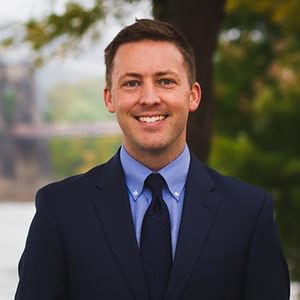Note: This information is from 2022 but much has changed since then. Please be sure to discuss your unique financial situation with your McKinley Carter Advisor or another trusted professional.

For those preparing for retirement, it is an exciting time. You have planned and worked hard to get to to this point, building your identity in your community, making friends, and making a difference in the world around you. However, when retirement is finally achieved, it can often create a sudden void that can be difficult to fill. It's very important to think through ways to find purpose during your retirement years. Here are five ways to help you do just that!
A few months ago, after 30 plus years working as a CRNA, my father retired. He had planned meticulously for years (with the help of his advisor) for this moment. He asked all the right questions: How much do I need? When should I take Social Security? How will I pay for health insurance? What about long term care? He was financially prepared and excited to take the leap into retirement. While he and my mom had asked all the right financial questions, the question the rest of us asked (and I think deep inside him as well) was, “What are you going to do with all your time?”
Many retirees are asking themselves similar questions. They have planned and worked hard for decades, building identities in communities, making friends, making a difference. But, so often, retirement can create a sudden void that can be difficult to fill. Some of the most commonly listed difficulties retirees share are: loss of social interaction, identity crisis, lack of structure, boredom, and loss of purpose, as George Jerjian speaks about from his own experience in this article: Jerjian Article.
When we work with clients on their Life Plan, one of the most impactful conversations we can have is helping them think through ways to find purpose in their retirement years. Below are five ways to help you find purpose in retirement:
1. Plan Your Week
This may sound strange at first. Afterall, you’ve had a schedule for years, and worked to not have one! But, If you are in or nearing retirement, think through the week ahead. Build out your schedule by adding times for appointments, exercise, travel, or even time for reading. Having things on the calendar will create things to look forward to, as well as help maintain structure for your day, even if it is structured around the things you want to do.
2. Cultivate Relationships
Nurture the relationships that you haven’t been able to before retirement. Meet for coffee, join a breakfast club, go to a local sporting event. (And add them to your calendar!). Taking time to deepen your relationships with those you care about will add deeper meaning to your days.
3. Board Work/Volunteer
Help yourself by helping others! Most of us have charities in our communities that support things we are passionate about. Volunteers are always needed. Find ways to serve, making an impact for those in need. Find ways to make an impact on a different level by joining the board (or multiple boards) of those charities that mean the most to you. A local food bank, children’s hospital, your country club. All present opportunities to stay engaged and help others.
4. Explore Hobbies and Passions. Or Find New Ones!
Diving deeper into hobbies you have, or have always wanted to have, is a great way to find your purpose during this next chapter. Learn to play a musical instrument such as the guitar or piano. Take painting or singing lessons. Write a book, woodwork, birdwatch, pickleball, golf, surf! Find what makes you come alive and focus on those things you can do, and work to improve your ability. And if you ever tire of your current hobby or passion project, it’s okay to move on to something new. You can build your own retirement talent stack.
5. Share Your Skills and Gifts
Lastly, as mentioned above, your identity may be in what your profession was. Your gifts and skills are likely needed in places you can share. If you worked in a professional setting such as a CPA, doctor, attorney, etc., there may be opportunities for you to teach at a local college or high school. If you play an instrument, join a band or participate in your symphony. If you can sing, share that gift with local nursing homes or schools. The world is waiting for you to share your gifts, knowledge, and talents.
Each of the above provides an opportunity for anyone who is retired, or nearing retirement, to think through their life plan and map out how they can make an impact — and find purpose in retirement. You have worked hard to get yourself here financially, so give yourself the gift of a purpose-filled retirement. We, at McKinley Carter, welcome the opportunity to lifeplan with you.
As for my father, he is a great example of a purpose-filled retirement. He spends his time hosting a weekly radio show, working part-time as a consultant, teaching a weekly Bible study, fishing, and has recently started writing a book.
